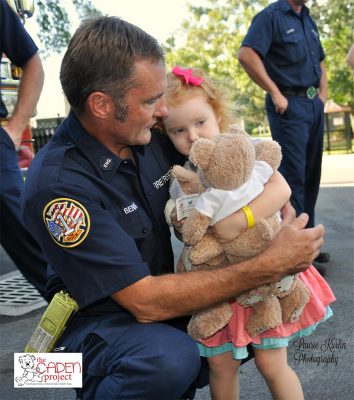Get the help you need right now 855-900-8437 Get Help Now
Get the help you need right now 855-900-8437 Get Help Now
If you are both a fire fighter and a parent, your kids probably already know your profession is different than the 9:00-5:00 jobs their classmates’ parents have. Whether it’s responding to a fatal fire, a mass shooting or a natural disaster, even young children can understand the inherit value, sacrifice and danger of your job. Likewise, when a line-of-duty death occurs in your department, the impact can be felt through every layer of your community. This can include your firehouse, your neighborhood, your family and your kids. Regardless of whether your children knew your deceased brother or sister, talking to your kids about the loss of life is never easy, especially when you are coping with your own grief and shock. To help you and your children during this challenging time, consider the following points:
The developmental stage of your child should guide your approach in talking to them. For kids ages 0-5, it’s possible they are unaware of the event and, thus, do not need an explicit explanation of the incident. It may be appropriate to say, “Daddy had a bad day at work,” and leave it at that. At this age, children lack an understanding of death and value predictable routines above all else. For kids ages 6-11, it may be helpful to inquire about what your child has already heard or understands about the incident. While avoiding the discussion all together may feel more comfortable for you in the short term, not directly acknowledging the loss can produce confusion and anxiety for your child at time when they need stability and reassurance. It’s appropriate to confirm broad facts of what occurred, while limiting exposure to media and discussion of unnecessary details or graphic content.
While teenagers may seem to have little reaction initially, they certainly understand that death is real, inevitable and irreversible. As a primary adult in the life of your teen, you have a critical opportunity to model some important life lessons: death is a part of life and sometimes bad things happen to good people. In particular, when death occurs earlier than it should, remind your teen it’s perfectly normal to be sad and angry, and want answers to important questions. Be honest with your teen that you may not have all the answers, but you are here and ready to listen when they are ready to talk.

Regardless of what type of fatality occurred, kids of all ages need to know they are safe and that their parents are safe. Kids need reassurance that adults in their life — parents, teachers, fire fighters and police — are doing everything possible to keep them safe from harm. In chaotic or emotional times, it is critical for your child that you stay consistent with mundane routines, such as pick-up and drop-off schedules and family meals. These rituals help convey a sense of normalcy to your child and send the message, “Even though this tragedy occurred, I am still here for you and your world is not changing.
For kids of fire fighters, convincing your children you are safe is a more complicated message. Don’t offer false realities or promises that you cannot keep. Instead, acknowledge your children’s fears and the inherit risks of your job, while offering assurance that fatal events (such as what occurred) do happen, but are exceedingly rare. Educate your children on the numerous precautions that are taken to ensure your safety on the job. When you are off duty and feel the time is right, consider taking your child to visit your firehouse to introduce them to some of the crew members and equipment that helps keep you safe.
In responding to a line-of-duty death or a tragedy, your kids will take a cue from you on how cope. Teach your kids it’s okay to grieve by talking about your feelings, accepting support from others and finding healthy outlets to manage pain. It’s okay to say, “Mom and dad feel sad (or scared) too. We don’t know why this happened, but we know we love you and love each other.” By acknowledging your own feelings in response to a tragic event, you are modeling a crucial life skill that your children need to cultivate: emotional intelligence.
Just as adults, no child responds to grief or tragedy the same way. Your main responsibility as a parent is to convey unconditional love and support to your child, listen when they are ready to talk and continue taking care of yourself. Despite your efforts and communication, some children will still have a tough time processing their grief, shock or trauma. If your child is displaying any of these signs, consult with your child’s teacher, counselor or physician for help.
Download a PDF version of this guide here.